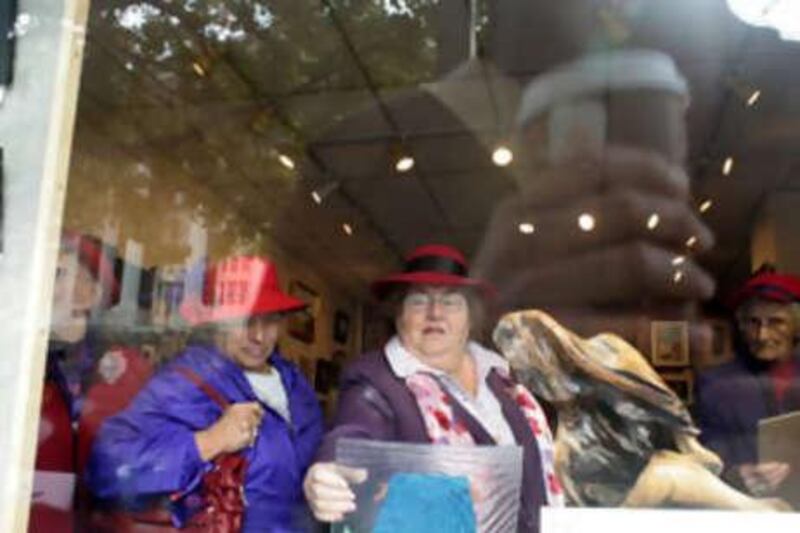BALTIMORE // The United States' bitter cultural wars over such issues as gambling, gay marriage and abortion may have taken a back seat to sharp worries about jobs and the economy, but many social questions will still be on state ballots on Nov 4. A number of states will be asking voters to decide on a host of social issues as they make their choices in the presidential and congressional races. Right-wing Republicans and the religiously minded are particularly vocal on social issues. But they appear to have lost their influence this year over large swathes of voters, who, polls suggest, are currently more interested in moderate, bipartisan policies to address their economic woes. Undeterred, a bipartisan coalition of Christian ministers in Maryland, which neighbours Washington, DC, has come together to fight against a proposed constitutional amendment that would legalise slot machine parlours. They are struggling against business groups, labour unions, state employees, police and horse-breeding and racing organisations that support slots as a way to ward off higher taxes to make up severe budgetary shortfalls. Church ministers, many of whom are African-American, invoke scripture to support their opposition to gambling, such as this line from Proverbs in the Bible: "An inheritance may be got hastily at the beginning; but the end thereof shall not be blessed." Other states voting on various proposals that would liberalise gaming laws include Colorado, Maine, Missouri and Ohio. A poll by The Washington Post last week showed that a broad majority in Maryland - 62 per cent - supported slot machine gambling, with only 36 per cent saying they would vote against and two per cent undecided. Voters appear to have been won over by money: slots are forecast to swell state coffers by US$600 million (Dh2.2 billion) a year that would go mostly to education but also to the struggling horse-racing industry. Concerns about an increase in crime and gambling addiction seem to be receding. The poll showed the highest support was in the port city of Baltimore, at 75 per cent. In the city's Fells Point neighbourhood, where the original deepwater sea port is surrounded by restored 18th-century townhouses, support was found among a variety of age and income groups. "A lot of Maryland's money goes out of the state to neighbouring states where there are slots, so we should change things," said Anna Carey, a member of the Red Hat Society of women older than 50 whose only rule is to "have fun". "We are gamblers and we even went away to New Jersey to gamble!" she said. Nearby Charles Town, West Virginia, also attracts a lot of Marylanders to the slot machines at its horse racing track. But Scott Kramer, who is a 38-year-old researcher, believed "gambling is as bad as smoking" and said: "It's predatory. Marylanders have rejected previous attempts to introduce slots, but special interests keep bringing it up. Most people don't really want it but just accept it." Eric Johnson, 49, was on the fence. "On the one hand, they say they're going to put extra money into education, which makes sense," he said. "But then they said they would do that with lottery money so I don't really know what to think." Mr Johnson, an African-American who works for the city and collects harbour rubbish from a small boat, said he would vote for Barack Obama, the Democratic presidential nominee, but was not particularly excited by the elections. "They all promise stuff, but nothing really changes for people like us," he said. This year's state initiatives could become more heated as the economy deteriorates and concern grows over funding for vital locally delivered services, including education. But state votes, especially on social issues, are often the subject of derision and humour. The satirical newspaper The Onion compiled a list called "What Else is on the Ballot?" One made-up example showed Florida deciding on whether to allow only slim people to qualify for residency. But one real-life example includes Connecticut, where voters will decide whether to have another vote on rewriting the state constitution. The convoluted proposal is backed by opponents of gay marriage but analysts believed it was unlikely to work. Florida, California and Arizona will vote on actual constitutional amendments banning same-sex marriage. Two dozen states have already passed similar amendments defining marriage as a union between a man and a woman. Gay marriage has proved to be a point of division between John McCain, the Republican presidential nominee, and Sarah Palin, his vice presidential candidate. Ms Palin said she supported a federal ban on such unions, but Mr McCain believes states should define marriage. Other social issues to be decided at the state level on Nov 4 include affirmative action. Colorado and Nebraska will vote on ending race and gender preferences in government hiring and college admissions. On abortion, a Colorado amendment seeks to include in the state definition of a person any fertilised egg, embryo or foetus. South Dakota will include an amendment to ban abortion with exceptions for rape, incest and the mother's health. A California measure would require parental notification for minors to obtain abortions. Political scientists will be watching closely to see if US citizens really do tilt to the centre even if the liberal Mr Obama scores a presidential victory. sdevi@thenational.ae
Polls indicate Right losing influence over social agenda
A number of states will be asking voters to decide on a host of social issues as they make their choices.

More from the national





